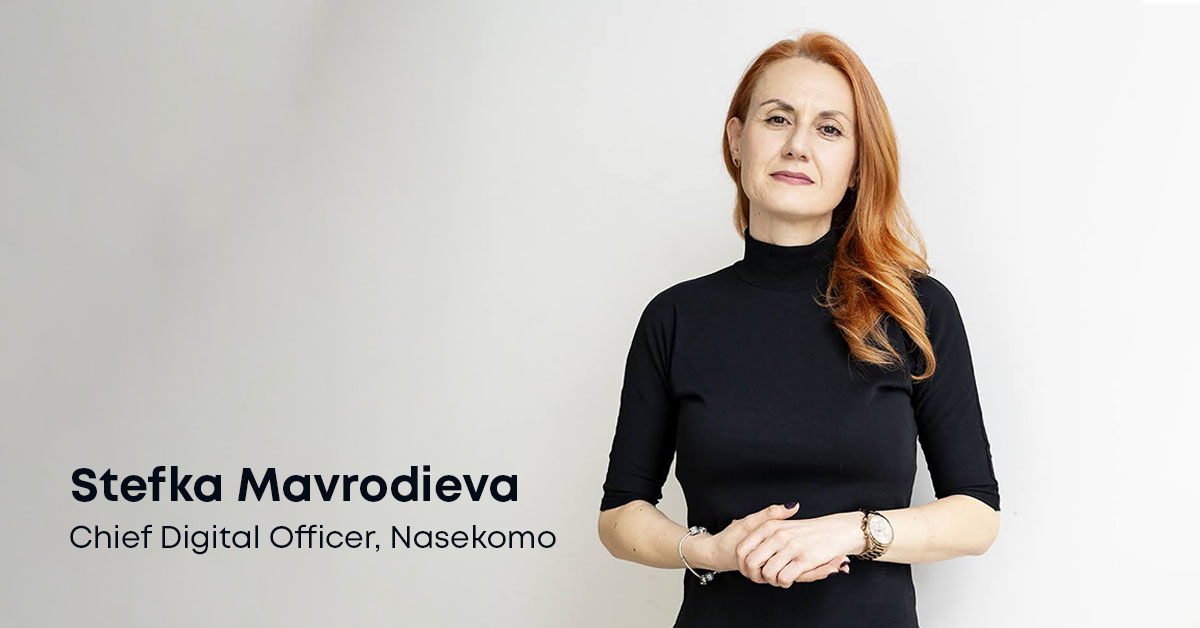In a world flooded with information, the real competitive edge lies in how you use your data — not just how much you collect. From retail to healthcare to finance, data-driven decision-making is already a strategic priority. But what about industries traditionally seen as less “digital”? What about manufacturing, biotech, or agriculture?
In this conversation with Stefka Mavrodieva – CDO of Nasekomo and guest lecturer in Telerik Academy’s Upskill Data & AI/BI program, we dive into the experience of a leader proving that data and AI are not just tools for tech companies — they are catalysts for transformation across every sector.
Find out how even complex, physical environments like production lines and biological systems can be optimized through intelligent automation, digital twins, and advanced analytics.

To begin with, could you briefly introduce yourself and your current role? What sparked your interest in intelligent automation and digital transformation in manufacturing?
I'm the Chief Digital Officer at Nasekomo, a biotechnology company that leverages insect bioconversion to transform organic biomass into sustainable feed and bio-based products. My role focuses on driving the digital agenda across our operations — this includes everything from data architecture and intelligent automation to AI integration and digital twinning.
What makes it particularly exciting is that we’re not just optimizing a single production site. Our goal is to build and scale a global network of franchisees — standardized, replicable, AI- and data-driven insect bioconversion factories. Our mission is to address global challenges like food quality, availability and overall sustainability that couldn’t be achieved by following the traditional way of production. That kind of global ambition demands a digital-first, AI-driven approach from day one to assure productivity, efficiency, velocity and sustainability.
My interest in digital is determined by the fact that manufacturing is full of data, but not always insight. It’s fascinating to leverage the intersection of genetics, biology and technology (software and industrial) at scale. The idea that we can bring intelligence into physical operations — making them more adaptive, efficient, and sustainable is both exciting and impactful. It’s about turning complexity into benefits to achieve better and faster outcomes especially in a fast-evolving biotech environment like ours.
In Telerik Academy’s Upskill Data & AI/BI program you’ll be talking about intelligent automation and digital twins. Can you explain these concepts in simple terms and how they are used in production environments?
At Nasekomo, intelligent automation means AI native production that leverage real-time data, predictive analytics, robotics, and autonomous systems to optimize every phase of the food value chain—from precision farming and supply chain logistics to food distribution and waste elimination. By embedding AI directly into industrial equipment, Nasekomo dramatically improves resource efficiency, forecast yield with high accuracy and maximize productivity.
How do digital twins help companies like Nasekomo improve their operations or decision-making processes?
Digital twins are crucial for simulating and improving operations, especially at scale. Imagine building a global franchisee network without simulating the process, equipment, utilities optimization, etc. We all know how much the exponential cost of an error is. Prior to building we design and simulate and after real operations we continue improving operations through the synergy between the AI and the Digital Twin.
Digital twin involves creating models that represent the key characteristics or behaviors of system, process, equipment, etc. and then experimenting with this model we observe how it evolves under different conditions.
It’s important to detect and eliminate bottlenecks, de-risk investment, optimize the process, enable scalability, improve decision-making, and assure better outcome in the physical world.
Let me share an example. One of the key milestones in our strategic development is Project 3B – an initiative that brings together biodiversity, biotechnology, and bioeconomy, designed to tackle some of the most crucial challenges in the company’s scale-up journey. As part of this initiative, we are expanding our digital capabilities, including the use of digital twins, to integrate advanced technologies into our operations. This allows us to model and simulate processes, detect bottlenecks early, and optimize performance across the value chain. Supported by the European Union through the National Recovery and Resilience Plan under the BG-RRP-1.011 "Economic Transformation Program", and funded by the European Union – NextGenerationEU, Project 3B is a clear example of how agriculture can go hand in hand with digitalization to drive meaningful transformation.
Can you share an example where data analysis led to a measurable improvement in a production process? What kind of data was crucial in that case?
For example, by analyzing environmental and biological data (e.g., temperature, humidity, feed conversion ratio), we identify optimal conditions to boost insect biomass yield. This came from correlating sensor data with performance KPIs and adjusting our parameters through AI-driven recommendations.
What kind of skills or knowledge do data professionals need in order to be successful in manufacturing-related roles today?
They need a strong grasp of data modeling, automation tools, and domain knowledge —especially understanding how physical processes behave. At Nasekomo, it’s the intersection of AI, IoT data, and biological understanding that drives real value. Critical thinking will be a key skill in the future virtual world embracing AI.
Why Data Matters, Everywhere
Data and AI are no longer confined to tech companies or digital-native industries. They’re drivers of real-world transformation — in biotech, manufacturing, logistics, and beyond. Whether you're optimizing a supply chain, scaling a production facility, or improving sustainability outcomes, the ability to turn data into insight is what gives organizations a competitive edge.
Because in today’s business reality, it’s not about the industry you’re in — it’s about how you use data to move it forward.
👉 If you're passionate about using data to drive meaningful impact, explore Telerik Academy's
Upskill Data & AI/BI program and apply today.






